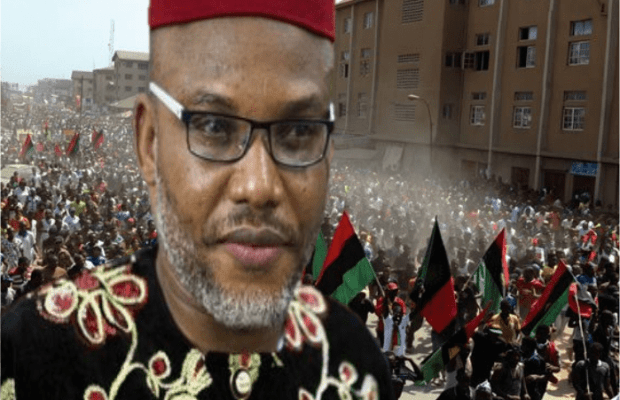
The Indigenous People of Biafra (IPOB) has asked the federal government to provide its leader, Nnamdi Kanu, as part of preconditions for reconciliation between it and the Nigerian government.
The group met Wednesday with a delegation of Igbo leaders in Enugu in continuation of their deliberation on peaceful reconciliation between them and the federal government as well as governments of the South-east zone according to Daily Trust Newspaper.
Mr Kanu is wanted by the Nigerian government for alleged treason. He has not been seen in public since September 2017 when the army raided his residence in Abia state.
The army denies knowing his whereabouts.
“The fate of our brother Nnamdi Kanu must be addressed. If the witch cried at night and the baby died in the morning, the witch must have killed the baby. Nnamdi Kanu did not rise and disappear. He is not the biblical prophet Elijah that got transfigured to heaven alive,” Aloy Ejimakor, German-based lawyer, who led the IPOB delegation said after the closed door meeting.
“Something happened; some people came to his house and those people are the men of the Nigerian Armed Forces. They (military) should speak to Nigerians and say, we went there, shot at people. Maybe we shot at him or wounded him. Let them say that much, then we know that the reconciliation has begun.
“So I recommend that if it is the truth and reconciliation commission that the federal government wants to constitute, let them do that. But some of these things need to be ventilated well. You cannot just come to Igboland or any other part of the country and take their dignity away, and behave as if nothing happened.
“The dignity of the Igboland and Biafra has been taken away since 2017 in the incident that took place at Afaraukwu, Umuahia. It shouldn’t happen. It needs some explanation, an apology is warranted.”
He further restated the demand for punishment of those who killed members of the group during the military exercise last year.
Mr Kanu has been at the vanguard of the call for an independent Biafra Republic from the Nigerian state through referendum.
Mr Kanu, who is facing charges of treasonable felony at the Federal High Court in Abuja, had called for a boycott of elections in Anambra last November if government failed to set a date for referendum. The call for boycott failed.
Clashes occurred between IPOB members and soldiers when the military commenced an operation in the South-east states last September.
Since then, Mr Kanu’s whereabouts has remained unknown.
While the army denies knowing his whereabouts, Mr Kanu’s lawyer, Ifeanyi Ejiofor, inisists that his client was kidnapped by the military after the clash on September 14 last year.
Also, speaking in an interview on BBC in February, Mr Kanu’s wife, Uche, maintained that the Nigerian Army should tell the world what happened to her husband, saying nobody in his family knows whether he was dead or alive.
While the federal government proscribed IPOB and labelled it a terrorist organisation in the wake of the clash, the U.S. government, however, said it does not see IPOB as a terrorist organisation, a position described as ‘unfortunate’ by the Nigerian government.







